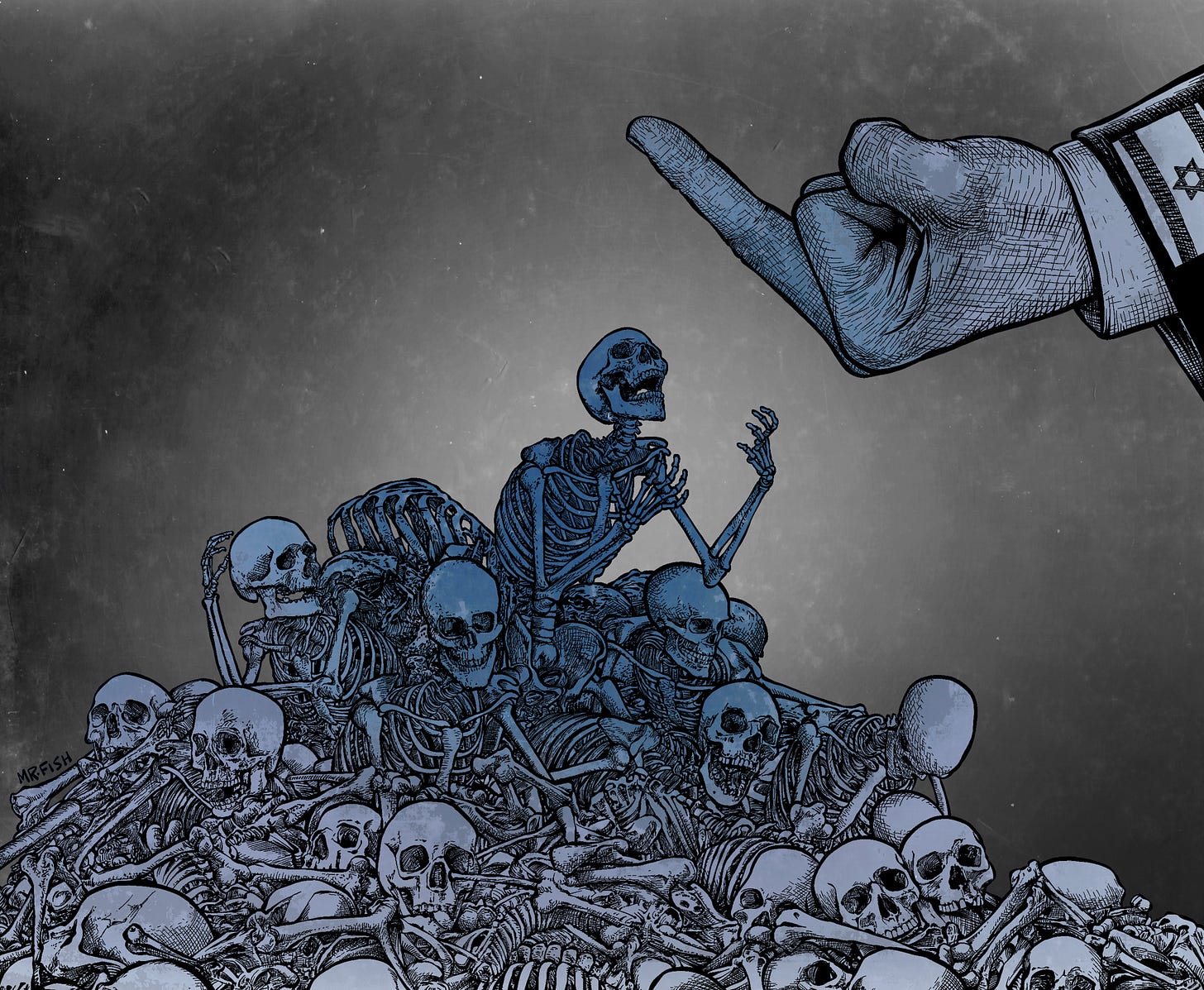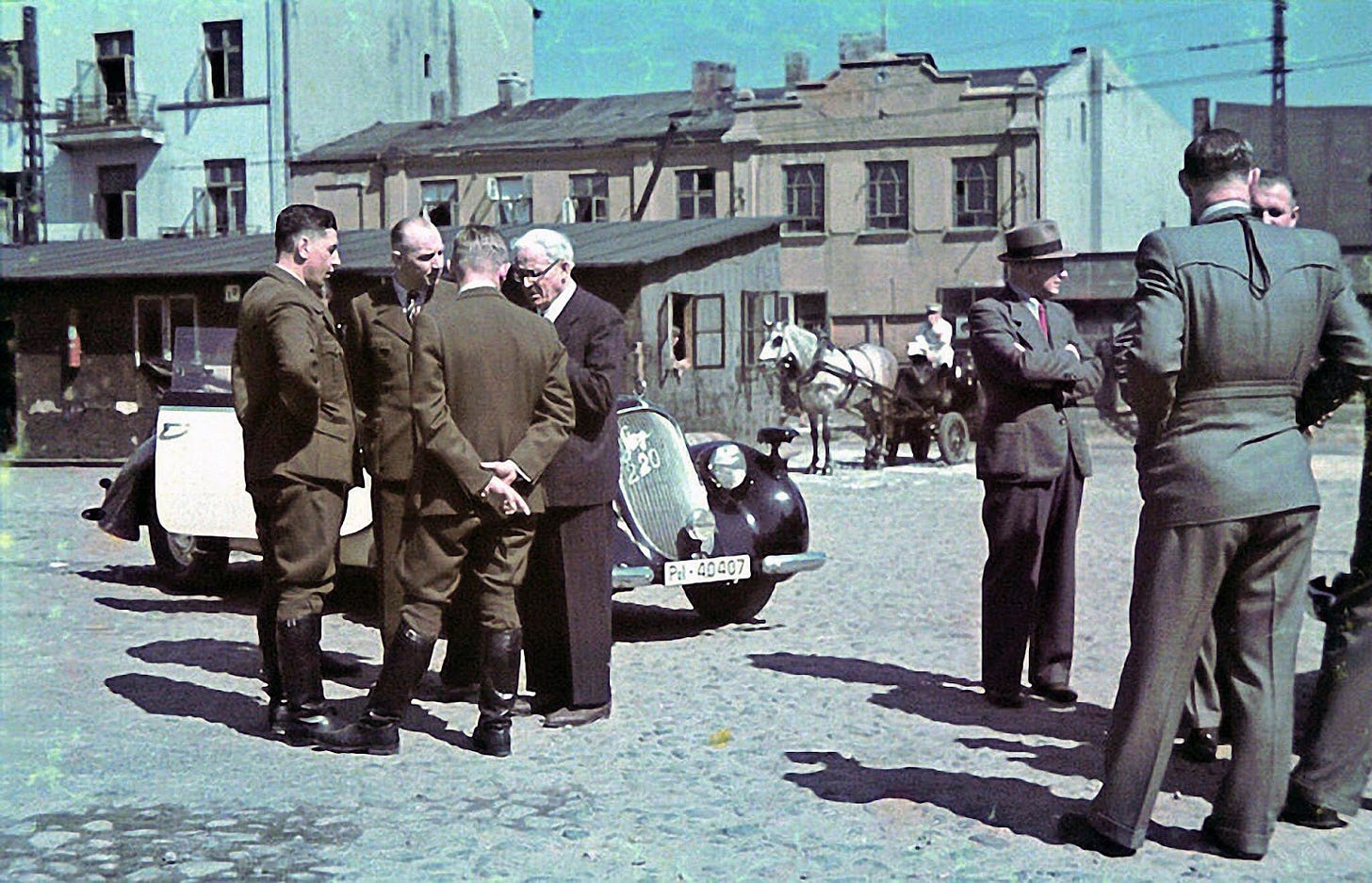Your Holocaust Here – by Mr. Fish (clowncrack.com)
Nearly all Holocaust scholars, who see in any criticism of Israel a betrayal of the Holocaust, have refused to condemn the genocide in Gaza. Not one of the institutions dedicated to researching and commemorating the Holocaust have drawn the obvious historical parallels or decried the mass slaughter of Palestinians.
Holocaust scholars, with a handful of exceptions, have exposed their true purpose, which is not to examine the dark side of human nature, the frightening propensity we all have to commit evil, but to sanctify Jews as eternal victims and absolve the ethnonationalist state of Israel of the crimes of settler colonialism, apartheid and genocide.
The hijacking of the Holocaust, the failure to defend Palestinian victims because they are Palestinian, has imploded the moral authority of Holocaust studies and Holocaust memorials. They have been exposed as a vehicles not to prevent genocide but to perpetrate it, not to explore the past, but manipulate the present.
Any tepid recognition that the Holocaust may not be the exclusive property of Israel and its Zionist supporters is swiftly shut down. The Holocaust Museum LA deleted an Instagram post that read: “NEVER AGAIN” CAN’T ONLY MEAN NEVER AGAIN FOR JEWS” after a backlash. In the hands of Zionists, “never again” means precisely that, never again only for Jews.
Aimé Césaire, in “Discourse on Colonialism,” writes that Hitler seemed exceptionally cruel only because he presided over “the humiliation of the white man,” applying to Europe the “colonialist procedures which until then had been reserved exclusively for the Arabs of Algeria, the coolies of India and the nègres d’Afrique.”
It was this distortion of the Holocaust as unique that troubled Primo Levi, who was imprisoned in Auschwitz from 1944 to 1945 and wrote “Survival in Auschwitz.” He was a fierce critic of the apartheid state of Israel and its treatment of the Palestinians. He saw the Shoah as “an inexhaustible source of evil” that “is perpetuated as hatred in the survivors, and springs up in a thousand ways, against the very will of all, as a thirst for revenge, as moral breakdown, as negation, as weariness, as resignation.”
He deplored “Manichaeanism,” those who “shun nuance and complexity” and who “reduce the river of human events to conflicts, and conflicts to duals, us and them.” He warned that the “network of human relationships inside the concentration camps was not simple: It could not be reduced to two blocs, victims and persecutors.” The enemy, he knew, “was outside but also inside.”
Levi writes about Mordechai Chaim Rumkowski, a Jewish collaborator who ruled the Lodz ghetto. Rumkowski, known as “King Chaim,” turned the ghetto into a slave labor camp which enriched the Nazis and himself. He deported opponents to death camps. He raped and molested girls and women. He demanded unquestioned obedience and embodied the evil of his oppressors. For Levi, he was an example of what many of us, under similar circumstances, are capable of becoming.
Ghetto Lodz, Litzmannstadt, Mordechai Chaim Rumkowski, head of the Council of Elders meets with German officials on a street of the ghetto, Poland 1940, World War II. (Photo by: Dukas/Universal Images Group via Getty Images)
“We are all mirrored in Rumkowski, his ambiguity is ours, it is our second nature, we hybrids molded from clay and spirit,” Levi wrote in “The Drowned and the Saved.” “[H]is fever is ours, the fever of our Western civilization that ‘descends into hell with trumpets and drums,’ and its miserable adornments are the distorting image of our symbols of social prestige.”
“Like Rumkowski, we too are so dazzled by power and prestige as to forget our essential fragility,” Levi adds. “[W]illingly or not, we come to terms with power, forgetting that we are all in the ghetto, that the ghetto is walled in, that outside the ghetto reign the lords of death and that close by the train is waiting.”
These bitter lessons of the Holocaust, which warn that the line between the victim and victimizer is razor thin, that we can all become willing executioners, that there is nothing intrinsically moral about being Jewish or a survivor of the Holocaust, are what Zionists seek to deny. Levi, for this reason, was persona non grata in Israel.
Holocaust studies, which exploded in the 1970s and were epitomized by the deification of the Holocaust survivor and fervent Zionist Elie Wiesel — literary critic Alfred Kazin called him a “Jesus of the Holocaust” — have now surrendered any claim to championing universal truths. These Holocaust scholars use a benchmark evil, as Norman Finkelstein points out, “not as a moral compass but rather as an ideological club.” The mantra “Do not compare,” Finkelstein writes, “is the mantra of moral blackmailers.”
Zionists find in the Holocaust and the Jewish state a sense of purpose and meaning, as well as a cloying moral superiority. After the 1967 war, when Israel seized Gaza and the West Bank, Israel, as Nathan Glazer approvingly observed, became “the religion of the American Jews.”
Holocaust studies are based on the fallacy that unique suffering confers unique entitlement. This was always the purpose of what Finkelstein calls “The Holocaust Industry.”
“Jewish suffering is depicted as ineffable, uncommunicable, and yet always to be proclaimed,” writes the European historian Charles Maier in “The Unmasterable Past: History, Holocaust, and German National Identity.” “It is intensely private, not to be diluted, but simultaneously public so that gentile society will confirm the crimes. A very peculiar suffering must be enshrined in public sites: Holocaust museums, memory gardens, deportation sites, dedicated not as Jewish but civic memorials. But what is the role of a museum in a country, such as the United States, far from the site of the Holocaust? … Under what circumstances can a private sorrow serve simultaneously as public grief? And if genocide is certified as a public sorrow, then must we not accept the credentials of other particular sorrows too? Do Armenians and Cambodians also have a right to publicly funded holocaust museums? And do we need memorials to Seventh Day Adventists and homosexuals for their persecution at the hands of the Third Reich?”
Any crime Israel carries out in the name of its survival — its “right to exist” — is justified in the name of this uniqueness. There are no limits. The world is black and white, a never-ending battle against Nazism, which is protean depending on who Israel targets. To challenge this bloodlust is to be an anti-Semite facilitating another genocide of Jews.
This simplistic formula not only serves the interests of Israel, but also the interests of colonial powers that carried out their own genocides, ones they seek to obscure. What was the annihilation of Native Americans by European settlers, the Armenians by Turks, the Indians in the Bengal famine by the British or the Soviet-orchestrated famine in the Ukraine? What was the dropping of the atomic bombs on Hiroshima and Nagasaki? Is Manifest Destiny any different from the Nazis’ embrace of the concept of Lebensraum? These too were holocausts, fueled by the same dehumanization and bloodlusts.
The sacralization of the Nazi Holocaust offers a bizarre quid pro quo. Arming and funding the state of Israel, preventing U.N. resolutions and sanctions from being adopted to condemn its crimes, and demonizing Palestinians and their supporters, is proof of atonement and support for Jews. Israel, in return, absolves the West of its indifference to the plight of Jews during the Holocaust, and Germany for perpetrating it.
Germany uses this unholy alliance to separate Nazism from the rest of German history, including the genocide German colonists carried out against the Nama and Herero in German South-West Africa, now Namibia.
“[S]uch magic,” Israeli historian and genocide scholar Raz Segal writes, “legitimizes racism against Palestinians at the very moment that Israel perpetrates genocide against them. The idea of Holocaust uniqueness thus reproduces rather than challenges the exclusionary nationalism and settler colonialism that led to the Holocaust.”
Segal, the director of the program in Holocaust and Genocide Studies at Stockton University in New Jersey, wrote an article on Gaza on Oct. 13, 2023 — six days after the incursion by Hamas and other Palestinian fighters into Israel — titled: “A Textbook Case of Genocide.” This denunciation from an Israeli Holocaust scholar, whose family members perished in the Holocaust, was a very lonely stance.
Segal saw in the Israeli government’s immediate demand that Palestinians evacuate the north of Gaza, and the blood-curdling demonization of the Palestinians by Israeli officials — the defense minister said Israel was “fighting human animals” — the stench of genocide.
“The whole idea about prevention and ‘never again’ is that — as we teach our students — there are red flags that once we notice them, we’re supposed to work in order to stop the process that could escalate to genocide,” Segal said when I interviewed him, “even if it’s not genocidal yet.”
You can watch my interview with Segal here.
“Holocaust studies as a field might be dead, which is not necessarily a bad thing,” he continued. “If indeed Holocaust studies is intertwined from the beginning with the ideology of global Holocaust memory, maybe it’s good that we won’t have Holocaust studies anymore. And maybe it will open the door for even more interesting and important research on the Holocaust as history, as real history.”
Segal paid for his courage and his honesty. The offer to lead the University of Minnesota’s Center for Holocaust and Genocide Studies — which has issued no condemnation of the genocide — was revoked.
Nearly two years into the genocide, the International Association of Genocide Scholars finally issued a statement saying that Israel’s conduct meets the legal definition set out in the U.N. Convention on Genocide.
But the vast majority of Holocaust scholars remain mute, endlessly condemning the atrocities committed by Hamas while ignoring those committed by Israel. They were mute when South Africa argued before the International Court of Justice that Israel was committing genocide. They were mute when Amnesty International published a report in December 2024 accusing Israel of genocide.
“How many Palestinian students apply to graduate programmes in Holocaust and Genocide Studies around the world? Usually none. How many Palestinian scholars identify themselves as scholars in this field? They, too, can be counted on one hand,” Segal writes in a co-authored article in the Journal of Genocide Research.
Genocide is coded in the DNA of Western imperialism. Palestine has made this clear. The genocide is the next stage in what the anthropologist Arjun Appadurai calls “a vast worldwide Malthusian correction” that is “geared to preparing the world for the winners of globalization, minus the inconvenient noise of its losers.”
The funding and arming of Israel by the United States and European nations as it carries out genocide has imploded the post-World War II international legal order. It no longer has credibility. The West cannot lecture anyone now about democracy, human rights or the supposed virtues of Western civilization.
“At the same time that Gaza induces vertigo, a feeling of chaos and emptiness, it becomes for countless powerless people the essential condition of political and ethical consciousness in the twenty-first century — just as the First World War was for a generation in the West,” Pankaj Mishra writes in “The World After Gaza.”
The ability to peddle the fiction that the Nazi Holocaust is unique, or that Jews are uniquely entitled, has ended. The genocide presages a new world order, one where Europe and the United States, along with their proxy Israel, are pariahs. Gaza has illuminated a dark truth — barbarism and Western civilization are inseparable.
This post has been syndicated from The Chris Hedges Report, where it was published under this address.


